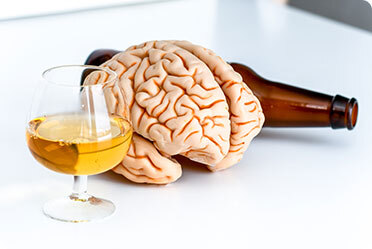
Being arrested for driving under the influence can be a very scary and trying time for the person accused of such a crime, which means you will have plenty of questions regarding your situation and what comes next. For those of you who have been arrested for DUI and wonder how the human body and brain processes alcohol, look no further, we have some of the answers for you right here in this article.
Three main topics will be discussed in this article: how the human body processes alcohol if you drank a lot in a short amount of time, how your body processes alcohol if you drank slowly over a period of hours, and how you process alcohol when drinking on an empty stomach versus a full stomach.
Drank Too Much In Short Period
So you were at a party for your friend’s birthday or just because it is the weekend, and you drank too much alcohol in a short period. This means that your body will not have enough time to break down the alcohol and get it out of your body. The more alcohol you drink in a short timeframe will affect your body negatively. Alcohol that is not broken down enters directly into the bloodstream and is transported to all of the major organs in your body.
When the alcohol hits the major organs, your body begins to shut down, which causes you to become tipsy to start and then drunk, clumsy, and out of control physically. Drinking too much alcohol in a short period is commonly referred to as binge drinking, which is very popular amongst teens and college students. Binge drinking commonly leads to the pumping of a person’s stomach in order to prevent the alcohol remaining in the stomach from entering the bloodstream and further damaging the body and brain.
In this scenario, the closer drinks are to one another, the longer it takes your body to process the alcohol. What you’re effectively doing is bottlenecking your liver, which can only process alcohol at a certain speed.
Drank Slowly Over A Period Of Hours
In another situation, you decided to have some people over for your favorite college football team’s bowl game. Instead of watching just the one game, your friends stayed for the post-game show and the game that followed. For the eight hours your friends were over and football was on TV, you kept drinking alcohol.
Now, in this scenario, you have been drinking alcohol slowly over a period of hours. Because you have not been binge drinking your body will have more time to recover from the alcohol that continues to enter the bloodstream. Your major organs will not be affected the same way as when you binge drink because there is not a massive amount of alcohol in the body at once. You will not be as inebriated as drinking too much in a short period, but you still could be intoxicated. Your level of intoxication still depends upon the amount of alcohol consumed.
Drinking On An Empty Stomach Vs. A Full Stomach
It is never a good idea to drink alcohol on an empty stomach. Drinking a lot of alcohol on an empty stomach will lead to a spike in the level of intoxication. This will not allow your body to properly absorb and eliminate the raw alcohol. Vomiting, loss of consciousness, and blackouts could result from this type of drinking behavior. When your stomach is empty of other liquids and solid foods, the alcohol has nothing to grasp hold of and will enter your bloodstream at full strength.
Drinking on a full stomach will make it tougher for the alcohol to take over the body and cause the person to get drunk, because the food in the stomach can help to absorb the alcohol before it enters the bloodstream. The longer amount of time alcohol stays in the stomach, the greater amount of metabolizing occurs.
Other factors that affect the speed of your body processing the alcohol include the following:
- The person’s gender
- The person’s race
- The person’s weight
- How many drinks were consumed
- How much time has passed since the consumption of the first drink
Leckerman Law focuses on safeguarding the
rights of individuals charged with DUI, DWI, DAI, and
other alcohol-related criminal offenses - Call Us Now For
NJ DWI (856) 429-2323 | For PA DUI (215) 496-9292